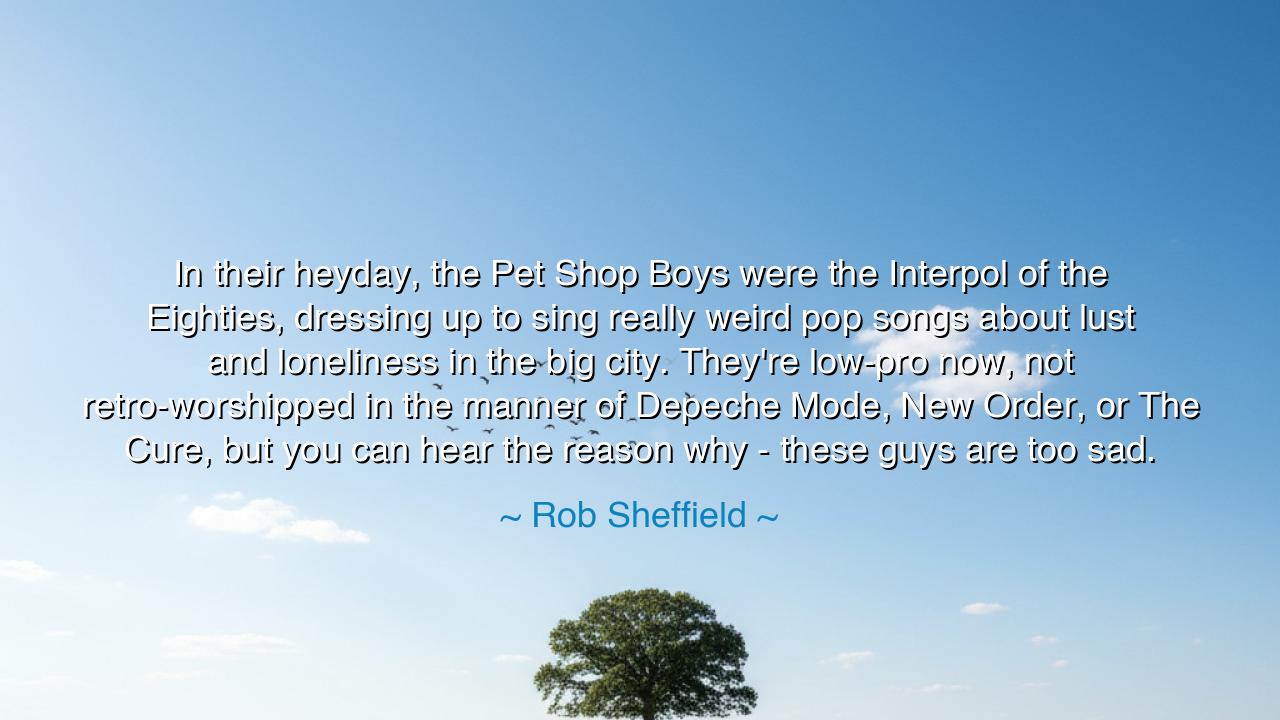
In their heyday, the Pet Shop Boys were the Interpol of the
In their heyday, the Pet Shop Boys were the Interpol of the Eighties, dressing up to sing really weird pop songs about lust and loneliness in the big city. They're low-pro now, not retro-worshipped in the manner of Depeche Mode, New Order, or The Cure, but you can hear the reason why - these guys are too sad.






When Rob Sheffield said, “In their heyday, the Pet Shop Boys were the Interpol of the Eighties, dressing up to sing really weird pop songs about lust and loneliness in the big city. They're low-pro now, not retro-worshipped in the manner of Depeche Mode, New Order, or The Cure, but you can hear the reason why — these guys are too sad,” he spoke not merely as a music critic, but as an observer of the human spirit expressed through art. In these words lies a deeper truth: that emotional honesty in creation can elevate work to timeless resonance, yet can also limit the comfort of nostalgia. Sheffield recognizes that the Pet Shop Boys’ brilliance was born of their acute engagement with loneliness and desire, emotions that define not only music, but the experience of modern urban life.
The ancients understood the power of such emotional depth. The Greek tragedians, from Sophocles to Euripides, crafted stories of longing, despair, and unfulfilled desire, knowing that the expression of sorrow could touch hearts and elevate understanding. Their choruses did not merely entertain; they reflected the human condition, allowing audiences to see themselves in the mirrored suffering of others. Sheffield’s observation echoes this wisdom: the Pet Shop Boys’ songs, though set to rhythm and dance, were a modern chorus of city isolation, a mirror for souls navigating crowded streets while feeling unseen.
In comparing them to Interpol, Sheffield highlights their continued resonance with the aesthetic of melancholy — a music that embraces sadness rather than shying from it. Yet he notes that they are “low-pro now,” not worshipped like contemporaries such as Depeche Mode or New Order. This insight is poignant: art that emerges from unfiltered sadness may fail to become ritualized nostalgia, for it is too intimate, too vulnerable, to be turned into mere homage. In other words, true engagement with the depths of the heart resists commodification; sadness cannot be neatly packaged for mass consumption.
The power of such artistry is evident throughout history. Consider Vincent van Gogh, whose brush captured the anguish and wonder of life with piercing honesty. His contemporaries did not yet recognize his genius; his vivid paintings of stars, cypresses, and sunflowers were too raw, too infused with personal sorrow, to be comfortably adored. Only later did history reveal that his emotional depth was precisely what made him extraordinary. Sheffield’s reflection on the Pet Shop Boys mirrors this lesson: to create from sadness is to risk obscurity, yet it is also the source of true impact.
Sheffield’s quote also reminds us that the mood of an artist shapes the reception of their work. Joy can be universally embraced, but sadness often isolates. The Pet Shop Boys, writing of lust and loneliness, offered neither easy comfort nor escapism. Their songs were portraits of the human heart in all its contradictions — playful on the surface, yet haunted beneath. Audiences can sense this emotional honesty; it draws admiration, even if it prevents widespread retro-style nostalgia. Art born of sadness is a dialogue with the soul, not merely a memory of pleasure.
This truth is echoed in literature as well. The poets of the Romantic era, from Shelley to Keats, were celebrated for their mastery of sorrow. Yet their genius was inseparable from the melancholy that defined them. To speak of loneliness and desire with unflinching clarity is to invite connection, but it is also to expose oneself to critique and misunderstanding. The Pet Shop Boys’ trajectory, as Sheffield observes, reflects this eternal balance: sadness begets authenticity, yet complicates popular remembrance.
The lesson is profound: embrace the truths of the heart in all their complexity, even when they render your work less universally adored. Authenticity may not always be rewarded with conventional fame or veneration, but it cultivates resonance that transcends superficial trends. To shy away from sadness for the sake of popularity is to dilute the soul’s voice; to confront it fully is to leave a legacy that speaks directly to the human condition.
So, O listener, carry Sheffield’s insight with care: recognize that the depth of your emotional honesty — your engagement with sorrow, longing, and vulnerability — is a source of enduring value. Let your work, like the Pet Shop Boys’ songs, reflect both the laughter and the loneliness of life. Honor the sadness, for it is the compass of authenticity, guiding both creator and audience toward true connection that endures beyond the fleeting applause of fashion and trend.






AAdministratorAdministrator
Welcome, honored guests. Please leave a comment, we will respond soon